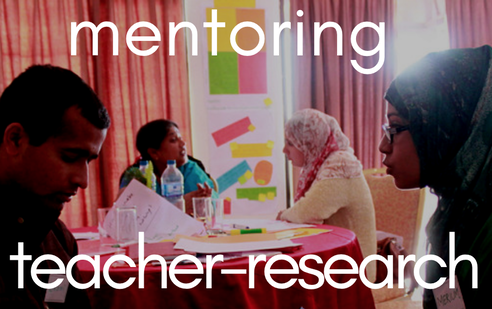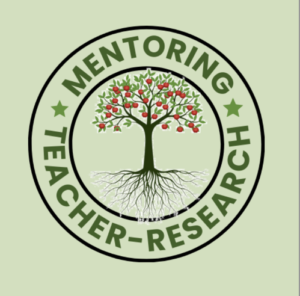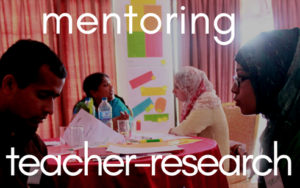
You can see a video of their 20-minute presentation here
Further Details
Further details
In January and February 2022 Richard Smith (University of Warwick, UK) and Seden Eraldemir Tuyan (Cağ University, Turkey) hosted a series of weekly input sessions and discussions on how to mentor teacher-research. This formed part of the TESOL CALL-IS Electronic Village Online (EVO) initiative and was supported by IATEFL Research SIG, The EVO ran from January 9th to February 13th.
For the intended constituency of this EVO, please see ‘Who is this EVO for?’ below. For those more interested in doing teacher-research themselves rather than in mentoring other teachers to do it, the alternative EVO on classroom-based research for professional development was advertised as a more appropriate home than this one.
We welcomed participation by new and experienced / returning mentors of teacher-research alike, as a main purpose of the EVO was to (continue to) build a community of mentors of teacher-research worldwide. We may be running the EVO again in January-February 2023. In the meantime, for those who wish to network around issues in teacher-research mentoring, we recommend joining our Facebook group (see ‘About’).
You can also watch a recording of the presentation Richard and Seden gave about the previous (2020) EVO on Mentoring teacher-research in April 2020.
More information:
Why this EVO?
Teacher-research can be a powerful process, having a profound impact on teachers and learners. There are now quite a few resources on classroom-based research which are easily available to English language teachers. However, there is a lack of guidance on how to support teacher research, particularly as a mentor. Accordingly, this EVO aims to create a community of teacher-research mentors, providing an opportunity to share insights and provide specific guidance to enable mentors and prospective mentors to play what can be a pivotal role in supporting teacher-research.
Who was this EVO for?
- Teacher educators, teacher development group leaders etc. who are currently mentoring teachers or student-teachers to do research into their classroom practice
- Intending or past mentors of teacher-research who to know more about the process before they begin (again)
- Curious but undecided potential teacher-research mentors who want to know more about what’s involved before they decide
- Decision-makers, administrators, school leaders, teacher educators or group leaders wondering whether to initiate and/or design a programme to encourage teacher-research
For *teachers* wanting support for their own classroom-based research, a different EVO was recommended – the one on ‘Classroom-based research for professional development’ (details here).
Contents and activities
Participants were engaged in the following activities:
- Sharing ideas about the nature of mentoring and what mentoring teacher-research might specifically need to involve
- A planning task involving consideration of who to mentor and establishment of a timeline and plan for effective communications
We also focused on the following stages of teacher-research mentoring, engaging participants in practical activities relating to each of them.
- Helping teachers to select a topic
- Guiding teachers to develop research questions
- Preparing teachers to collect data
- Guiding teachers to analyse and interpret data
- Supporting teachers to plan and evaluate change
- Helping teachers to share and reflect on their research
The syllabus and practical activities were based on a new British Council publication, Mentoring Teachers to Research Their Classrooms: A Practical Handbook. Itself based on experience in Latin America and South Asia, this was complemented by questions and insights from participants themselves in relation to their own experiences. Finally, we encouraged teacher-research mentors to continue to link up internationally, and we indicated resources and possibilities for follow-up.
Programme
Week 1: (January 9 – 15)
What does teacher-research mentoring involve? / 1st online meeting – Sun. Jan. 9, 14:30 (GMT)
- Sharing of teacher-research and teacher-research mentoring experiences among participants
- Discussion of why mentoring is important for supporting teacher-research
- Sharing ideas about the nature of mentoring and what mentoring teacher-research specifically needs to involve
Week 2: (January 16 – 22)
Developing topics and questions / 2nd online meeting– Sun Jan 16, 14:30 (GMT)
- Helping teachers to select a topic
- Guiding teachers to develop research questions
Week 3: (January 23 – 29)
Supporting data collection, analysis and interpretation / 3rd online meeting – Sun Jan 23,14:30 (GMT)
- Preparing teachers to collect data
- Guiding teachers to analyse and interpret data
Week 4: (January 30 – February 5)
Making a mentoring plan – and guiding teachers to plan and evaluate change / 4th online meeting – Sun Jan. 30, 14:30 (GMT)
- A planning task involving consideration of who to mentor and establishment of a timeline and effective communications
- Supporting teachers to plan and evaluate change
Week 5: (February 6 – 13)
Helping teachers to share and reflect on their research / 5th online meeting – Sun Feb 6, 14:30 (GMT) & 6th online meeting – Sun. Feb 13, 14:30 (GMT); plus, extra bonus session: ‘Mentees’ and Mentors’ voices’ (with Classroom-based Research for Professional Development EVO participants) on Sun Feb 6 at 12.00 (GMT)
- Helping teachers to share and reflect on their research
- Wrap-up, taking things further, and evaluation of the EVO
Your hosts
Dr Richard Smith has worked in teacher education for almost 25 years, the last 20 of them in the UK at the University of Warwick. He is the former coordinator of the IATEFL Research SIG and founder and chair of the steering committee of the International Festival of Teacher-research in ELT. He has published widely on topics ranging from teacher-research to the history of language learning and teaching, and has worked with teachers from many countries, both directly and as academic adviser to teacher-research mentoring schemes in Latin America and South Asia. For his publications and further information see http://warwick.ac.uk/richardcsmith
Dr Seden Eraldemir Tuyan is a lecturer in the Department of English Language Teaching at Çağ University, Mersin, Turkey, and is interested in psychological perspectives on ELT, including individual learner differences in language learning, motivation, learner autonomy and beliefs. She has published articles on various aspects of affect in foreign language learning. Her major interests are Emotional Intelligence, Social-Emotional Learning, individual differences in SLA, Action Research, and personal and professional development.
Registration
There was no cost for participation in the EVO. If there are plans to repeat the EVO they will be posted here and in the Facebook group associated with this website.



